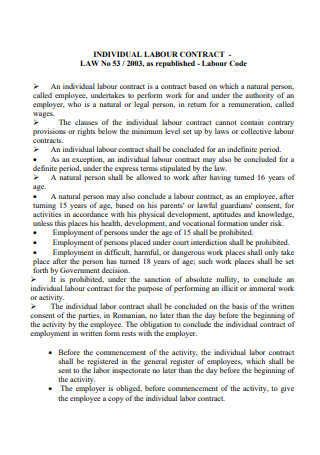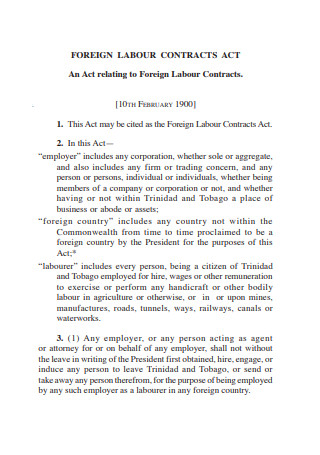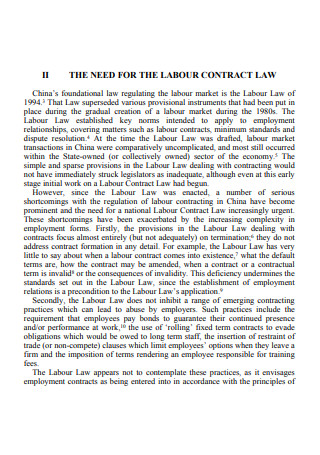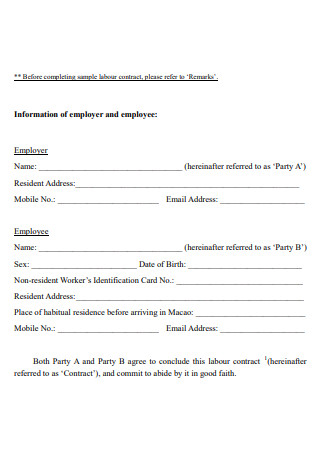3+ Sample Labour Contract
FREE Labour Contract s to Download
3+ Sample Labour Contract
What Is a Labour Contract?
What Are a Different Kind of Contract Labour Forms?
What Is the Importance of Having Contract Labour Forms?
What Is the Difference Between an Independent Contractor and an Employee?
Inclusions of Labour Contract
How to Write a Labour Contract
FAQs
What Is the Purpose of a Labour Contract?
When Do You Need to Know Contract Labour Rules?
What Does it Mean to be a Labour- Only Contractor?
How Are the Parties Listed in a Labour Contract?
What Is a Labour Contract?
Specific covenants between the employer and the employee will be established in a labour contract as well. As part of this, the employer often makes a promise to maintain a work environment that is in compliance with any applicable government legislation pertaining to workplace safety. As a condition of ongoing employment, the employer agrees to abide by all applicable local jurisdictional laws, including those governing dismissal and any severance payments that the employee may be entitled to as a result of the termination of employment. In addition to defining what is expected of each party, such provisions give a framework for evaluating how well both the employee and the employer are performing in relation to those expectations. Other templates are available on our website, and you can use them whenever you need them. They are as follows: remodeling labor contract, registration of labor contract form, contract labor information form, contract labor form free, labor hire contract, casual labor contract, labor supply contract, free contract, labour contract, labour contract in word, and other similar template are available. This post will not only provide you with templates, but will also provide you with important information that you need to know in order to complete your template.
What Are a Different Kind of Contract Labour Forms?
There are many different sorts of forms that firms that supply manpower services use to ensure that all of their clients are aware of the terms and circumstances of the labor that is provided. Listed below are a few instances of these kinds of forms:
1. Labour Contract Agreement Forms
Are the types of documents that contractors use to inform their clients about the type of agreement they intend to make with respect to the labor they will be giving to the client. The customer can decide whether or not to accept the arrangement, or both sides can negotiate until they reach a mutually agreeable solution.
2. Contract Work Form Fee
Are forms that contractors use to ensure that their clients understand the total cost of all of the labour that has been performed on their projects. These assist in providing detailed information on what they are required to pay for and how much they need to spend.
3. Remodeling Labour Contract Forms
Are designed for clients who employ organizations that specialize in remodeling work and with whom they intend to enter into a legally binding agreement.
What Is the Importance of Having Contract Labour Forms?
Before agreeing to any sort of labor service, it is critical that you ensure that you have the necessary contracts in place. Consider them in the same light as Service Contract Approval Forms: both require the approval of the client as to the sort of service to be delivered before any form of labour or service can be performed. These are beneficial not just to the client, but they are also beneficial to the contractor who is delivering the labor. It assists them in informing the client about the type of labour they will be performing and the amount of money they will be owed at the conclusion of the service. It also specifies the terms and circumstances of the contract and gives the contractor the freedom to carry out his or her duties as he or she sees appropriate, given that the customer is in agreement with the provisions of the contract. For this reason, if you’re planning on hiring someone to perform labour on your behalf, you’ll need to be certain that you obtain the appropriate paperwork.
What Is the Difference Between an Independent Contractor and an Employee?
Independent contractors come in a range of shapes and sizes. Some of them may be business owners in their own right. He or she could own a small business that offers a variety of services, such as information technology services. Others are professional contractors, such as a lawyer, doctor, or dentist, who provide their services for a fee. When a company decides to contract out duties that would ordinarily be performed by employees to independent contractors, things might get a little difficult. The contractor will be compensated in a single lump sum. Due to the fact that no taxes will be withheld from the lump sum payment, the contractor will be responsible for his or her own tax obligations. Independent contractors are liable to self-employment taxes, which are levied on their earnings. In the perspective of the law, a contractor is considered self-employed and is therefore not subject to the provisions of federal employment legislation. If you engage independent contractors, you may be able to deduct their salary from your taxable income. You will be required to send contractors with a 1099-MISC form as well as an IRS Form 1096, which will detail how much they were paid. You will need to collaborate closely with your accountant to ensure that you are complying with the law when it comes to write-offs and other tax breaks.
Employees’ federal and state income taxes will be withheld by their employers. A portion of the Social Security and Medicare taxes is withheld as well. Half of an employee’s Medicare and Social Security taxes will be covered by the employer. The independent contractor will be responsible for paying any applicable taxes. Additionally, an independent contractor is ineligible for any type of workers’ compensation or unemployment compensation benefits. Independent contractors are not protected from employment discrimination and are not entitled to FMLA leave under the terms of the Family Medical Leave Act (FMLA). In the event that you or a member of your family need time off due to an illness or disability, you will not be allowed any leave or job protection. You can just walk away from a project, or you can be fired by the person who hired you to do the work.
Inclusions of Labour Contract
You have the ability to tell the difference between a well-written labour contract agreement and a poorly written labor contract agreement. Simply look over the main inclusions listed below to see if they are applicable:
How to Write a Labour Contract
In labour contract agreements, construction agreements are frequently mentioned as a topic area. If you decide to write a building contract sooner rather than later, have a look at this fast instruction on how to draft construction contracts.
1. Provide a description of the type of construction service you want
Construction could refer to a single piece of labour or a series of smaller activities. Specify the type of construction service that will be provided in your contract from the very beginning of the agreement.
2. Please provide specifics about the construction project
A specialized construction project, such as a building, necessitates the inclusion of specific elements in order to facilitate identification, which should be explicitly stated in the contract.
3. Agreement about how things will be done
Include in your contract agreement the payment of wages and other construction benefits. In some cases, additional services may be given that necessitate the use of supplementary Home Renovation Contract Templates that are compliant with other legal agreements.
An agreement of this nature must first discuss the parties by providing their personal information, such as their names, addresses, and phone numbers, and then identify the relevant dates, such as the effective date and termination date. Another significant portion of a contract labour agreement is the section in which the terms and conditions of payment are laid out in detail. The terms and conditions of a contract labour agreement must state the rules and regulations that both parties must agree to and follow in order for the agreement to be valid.
FAQs
What Is the Purpose of a Labour Contract?
A labour contract, which is also known as a labour agreement, is a legally binding agreement that specifies the rules and regulations that will regulate the relationship between an employer and an employee. A labour contract is also known as a labour agreement since it is legally binding.
When Do You Need to Know Contract Labour Rules?
If you are an employer or an independent contractor, it is critical that you understand the contract labour standards. It is necessary for both parties to follow a number of extremely crucial guidelines in order to be secure in the eyes of the law. An independent contractor is a person who works for a company under the terms of a contract and is responsible for a variety of activities.
What Does it Mean to be a Labour- Only Contractor?
Contracting for sole labour is not permitted. It refers to a contracting arrangement that is in violation of the laws and regulations governing contracting and job contracting, among other things. Unless otherwise stated, all contractors are assumed to be labor-only contractors by default. When labor-only contracting is discovered, the principal is declared to be the employer in the situation.
How Are the Parties Listed in a Labour Contract?
If there are more than one employer and union involved in the labor contract, the names of all of the parties are provided. The names of the parties may be listed in alphabetical order or in descending order of importance, such as the largest employer and union being listed first, followed by secondary parties.
Specific covenants between the employer and the employee will be established in a labour contract as well. As part of this, the employer often makes a promise to maintain a work environment that is in compliance with any applicable government legislation pertaining to workplace safety. As a condition of ongoing employment, the employer agrees to abide by all applicable local jurisdictional laws, including those governing dismissal and any severance payments that the employee may be entitled to as a result of the termination of employment. In addition to defining what is expected of each party, such provisions give a framework for evaluating how well both the employee and the employer are performing in relation to those expectations. Workers were once required to refrain from joining any type of trade union at some period after the start of their job, which was sometimes stipulated in their labour contract. This form of agreement, which is also referred to as a “yellow-dog contract,” is currently deemed unlawful in many countries throughout the world. Terms that could potentially conflict with government regulations or unduly restrict the rights of employees are also frequently considered grounds for terminating a contract or imposing fines on any employer who demands a commitment to an agreement that contains those types of clauses.




